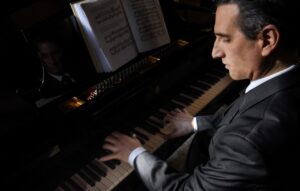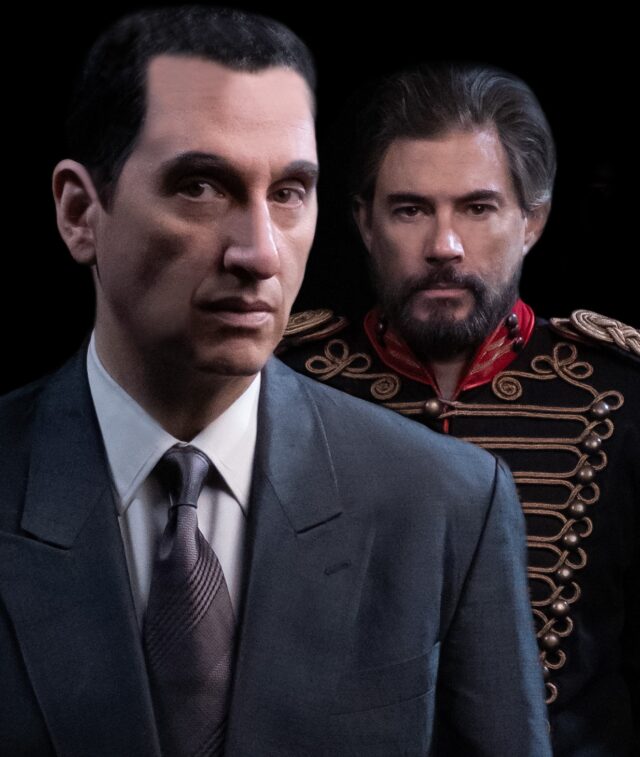In a World Premiere performance at The Broad Stage, Hershey Felder and Jonathan Silvestri come together to show how nobody is spared when the bloody hurricane of history blows.
By John Lavitt
Los Angeles, CA (The Hollywood Times) 08-11-2024
An invigorating World Premiere occurred at The Eli and Edyth Broad Stage when HFP presented a new musical play, Rachmaninoff And The Tsar. Starring Hershey Felder as Sergei Rachmaninoff and Jonathan Silvestri as Tsar Nicholas II, the play is such an exciting change of pace for HFP (Hershey Felder Productions). For decades, Hershey Felder has cornered the market for recreating the music, lives, presence, and feel of great composers on stage as incredible one-person shows. However, in this show, he brings another actor on stage to take the work to another level of excellence.
From George Gershwin and Ludwig Van Beethoven to Irving Berlin and Claude Debussy, Hershey Felder has recreated the lives of the greatest composers in history on stages worldwide. Ken Burns is the only person to compare his genius and comprehensiveness to in the modern age. In the same way that Ken Burns created in-depth documentaries on diverse subjects, becoming a singular force in American culture, Hershey Felder did the same on the stage for the one-person performance.
Beyond playing the works of these composers, Felder becomes each man in bearing and stance, accent and expression. In the same way that Ken Burns transports you back to the Civil War, the roots of Jazz, or the early days of Baseball, Felder transports his audience into the lives and souls of these composers. His achievement is the seamless adoption of the lives of so many historical figures from show to show without feeling repetitive or obvious. Each composer is given the flavor of their genius.
In the new production, Felder takes on the life of Sergei Rachmaninoff and the historical trauma brought on by the Russian Revolution in the early 20th century. The writer and performer must have realized he needed more to accomplish such a task. The performance takes place during a fever dream of Rachmaninoff on his deathbed in Beverly Hills in 1943. Rachmaninoff finds himself in his beloved garden with a not-so-beloved guest as the fever takes over. Indeed, he is surprised to find himself haunted by the charming, refined ghost of Tsar Nicholas II.

Born in England and possessing dual British and Italian citizenship, Jonathan Silvestri is genuinely a man of the world. Handsome and empathetic, he is a beautiful choice to bring forth the humanity of the Tsar. As Nicholas II and Rachmaninoff discuss the tragedy and horrors of the Russian Revolution, they overcome the pointing of fingers at each other to find common ground. Not wanting to give too much away, the play does delve into the details of Rachmaninoff’s attempt to save the woman who claims to be Anastasia Romanov, the surviving daughter of the Tsar.
By bringing Rachmaninoff and Nicholas II together, Felder demonstrates how difficult it is to escape the heavy shadows of historical trauma. Although he fled the Soviet Union after the Bolshevik takeover, Rachmaninoff was never the same man again, and the compositions would not come. As for Nicholas II, his fall from power led to him and his family paying the ultimate price. The scars of losing one’s homeland run deep and never truly heal.
Directed with precision by Trevor Hay, the show’s success is the interaction between the two men. Although Nicholas II is the ghost of an autocratic ruler, he comes across as much softer than Rachmaninoff. The triumph of Silvestri’s performance is the caring and love he shows for his family. Rather than long for the power lost, he longs for their happiness and mourns the price they paid. When he hears about Anastasia from Rachmaninoff, you can feel the hope in his voice. Even in the afterlife, he dreams of her survival and the success of a potential life in the new world.

What is so impressive about Felder’s performance as a different composer is how he celebrates them by revealing their truth. He never backs away from the warts and complex personalities. Although Rachmaninoff loves his country and music, he is not a warm, obviously loving man. Indeed, the play’s irony is that Nicholas II feels more human than Rachmaninoff. Such a sense of humanity has nothing to do with a lack of performance but instead with the reality of these two men. Nicholas II was a true family man, and Rachmaninoff was not. Thus, Felder represents the truth of the historical record: The wounds of the revolution run deep, they never truly heal, and the scars are ugly. The cost of historical trauma is profound in the lives of these two men.
As a final note, all of Hershey Felder’s one-person triumphs are available to stream for a reasonable cost at https://www.hersheyfelder.net/. In addition, this Renaissance man and cultural titan offers much more. I have never gone wrong over the years when choosing to experience a Hershey Felder performance and creation.





